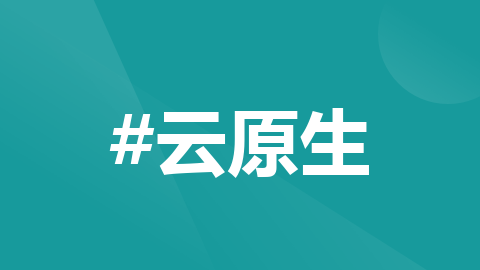
K8s(三)Pod资源——pod亲和性与反亲和性,pod重启策略
本文主要介绍了pod资源与pod相关的亲和性,以及pod的重启策略。
·
目录
本文主要介绍了pod资源与pod相关的亲和性,以及pod的重启策略
pod亲和性与反亲和性
pod亲和性(podAffinity)有两种 1.podaffinity,即联系比较紧密的pod更倾向于使用同一个区域 比如tomcat和nginx这样资源的利用效率更高
2.podunaffinity,即两套完全相同,或两套完全不同功能的服务 为了不互相影响容灾效果,或者让服务之间不会互相影响,更倾向于不适用同一个区域
那么如何判断是不是“同一个区域”就非常重要
#查看帮助
kubectl explain pods.spec.affinity.podAffinity
preferredDuringSchedulingIgnoredDuringExecution #软亲和性,尽可能在一起
requiredDuringSchedulingIgnoredDuringExecution #硬亲和性,一定要在一起
pod亲和性
#硬亲和性
kubectl explain pods.spec.affinity.podAffinity.requiredDuringSchedulingIgnoredDuringExecution
labelSelector <Object> #以标签为筛选条件,选择一组亲和的pod
namespaceSelector <Object> #以命名空间为筛选条件,选择一组亲和的pod
namespaces <[]string> #确定命名空间的位置
topologyKey <string> -required- #拓扑逻辑键,根据xx判断是否是同一位置
cat > qinhe-pod1.yaml << EOF
apiVersion: v1
kind: Pod
metadata:
name: qinhe1
namespace: default
labels:
user: ws
spec:
containers:
- name: qinhe1
image: docker.io/library/nginx
imagePullPolicy: IfNotPresent
EOF
kubectl apply -f qinhe-pod1.yaml #定义一个初始的pod,后面的pod可以依次为参照
echo "
apiVersion: v1
kind: Pod
metadata:
name: qinhe2
labels:
app: app1
spec:
containers:
- name: qinhe2
image: docker.io/library/nginx
imagePullPolicy: IfNotPresent
affinity:
podAffinity: # 和pod亲和性
requiredDuringSchedulingIgnoredDuringExecution:
- labelSelector: # 以标签为筛选条件
matchExpressions: # 以表达式进行匹配
- {key: user, operator: In, values: ["ws"]}
topologyKey: kubernetes.io/hostname
#带有kubernetes.io/hostname标签相同的被认为是同一个区域,即以主机名区分
#标签的node被认为是统一位置
" > qinhe-pod2.yaml
kubectl apply -f qinhe-pod2.yaml
kubectl get pods -owide #因为hostname node1和node2不同,所以只会调度到node1
NAME READY STATUS RESTARTS AGE IP NODE NOMINATED NODE READINESS GATES
qinhe1 1/1 Running 0 68s 10.10.179.9 ws-k8s-node1 <none> <none>
qinhe2 1/1 Running 0 21s 10.10.179.10 ws-k8s-node1 <none> <none>
#修改
...
topologyKey: beta.kubernetes.io/arch
... #node1和node2这两个标签都相同
kubectl delete -f qinhe-pod2.yaml
kubectl apply -f qinhe-pod2.yaml
kubectl get pods -owide #再查看时会发现qinhe2分到了node2
NAME READY STATUS RESTARTS AGE IP NODE NOMINATED NODE READINESS GATES
qinhe1 1/1 Running 0 4m55s 10.10.179.9 ws-k8s-node1 <none> <none>
qinhe2 1/1 Running 0 15s 10.10.234.68 ws-k8s-node2 <none> <none>
#清理环境
kubectl delete -f qinhe-pod1.yaml
kubectl delete -f qinhe-pod2.yaml
pod反亲和性
kubectl explain pods.spec.affinity.podAntiAffinity
preferredDuringSchedulingIgnoredDuringExecution <[]Object>
requiredDuringSchedulingIgnoredDuringExecution <[]Object>
#硬亲和性
#创建qinhe-pod3.yaml
cat > qinhe-pod3.yaml << EOF
apiVersion: v1
kind: Pod
metadata:
name: qinhe3
namespace: default
labels:
user: ws
spec:
containers:
- name: qinhe3
image: docker.io/library/nginx
imagePullPolicy: IfNotPresent
EOF
#创建qinhe-pod4.yaml
echo "
apiVersion: v1
kind: Pod
metadata:
name: qinhe4
labels:
app: app1
spec:
containers:
- name: qinhe4
image: docker.io/library/nginx
imagePullPolicy: IfNotPresent
affinity:
podAntiAffinity: # 和pod亲和性
requiredDuringSchedulingIgnoredDuringExecution:
- labelSelector: # 以标签为筛选条件
matchExpressions: # 以表达式进行匹配
- {key: user, operator: In, values: ["ws"]} #表达式user=ws
topologyKey: kubernetes.io/hostname #以hostname作为区分是否同个区域
" > qinhe-pod4.yaml
kubectl apply -f qinhe-pod3.yaml
kubectl apply -f qinhe-pod4.yaml
#分配到了不同的node
kubectl get pods -owide
NAME READY STATUS RESTARTS AGE IP NODE NOMINATED NODE READINESS GATES
qinhe3 1/1 Running 0 9s 10.10.179.11 ws-k8s-node1 <none> <none>
qinhe4 1/1 Running 0 8s 10.10.234.70 ws-k8s-node2 <none> <none>
#修改topologyKey
pod4修改为topologyKey: user
kubectl label nodes ws-k8s-node1 user=xhy
kubectl label nodes ws-k8s-node2 user=xhy
#现在node1和node2都会被pod4识别为同一位置,因为node的label中user值相同
kubectl delete -f qinhe-pod4.yaml
kubectl apply -f qinhe-pod4.yaml
#直接显示离线
kubectl get pods -owide
NAME READY STATUS RESTARTS AGE IP NODE NOMINATED NODE READINESS GATES
qinhe3 1/1 Running 0 9m59s 10.10.179.12 ws-k8s-node1 <none> <none>
qinhe4 0/1 Pending 0 2s <none> <none> <none> <none>
#查看日志
Warning FailedScheduling 74s default-scheduler 0/4 nodes are available: 2 node(s) didn't match pod anti-affinity rules, 2 node(s) had untolerated taint {node-role.kubernetes.io/control-plane: }. preemption: 0/4 nodes are available: 2 No preemption victims found for incoming pod, 2 Preemption is not helpful for scheduling..
#pod反亲和性的软亲和性与node亲和性的软亲和性同理
#清理环境
kubectl label nodes ws-k8s-node1 user-
kubectl label nodes ws-k8s-node2 user-
kubectl delete -f qinhe-pod3.yaml
kubectl delete -f qinhe-pod4.yaml
pod状态与重启策略
pod状态
1.pending——挂起
(1)正在创建pod,检查存储、网络、下载镜像等问题
(2)条件不满足,比如硬亲和性,污点等调度条件不满足
2.failed——失败
至少有一个容器因为失败而停止,即非0状态退出
3.unknown——未知
apiserver连不上node节点的kubelet,通常是网络问题
4.Error——错误
5.succeeded——成功
pod所有容器成功终止
6.Unschedulable
pod不能被调度
7.PodScheduled
正在调度中
8.Initialized
pod初始化完成
9.ImagePullBackOff
容器拉取失败
10.evicted
node节点资源不足
11.CrashLoopBackOff
容器曾经启动,但又异常退出了
pod重启策略
当容器异常时,可以通过设置RestartPolicy字段,设置pod重启策略来对pod进行重启等操作
#查看帮助
kubectl explain pod.spec.restartPolicy
KIND: Pod
VERSION: v1
FIELD: restartPolicy <string>
DESCRIPTION:
Restart policy for all containers within the pod. One of Always, OnFailure,
Never. Default to Always. More info:
<https://kubernetes.io/docs/concepts/workloads/pods/pod-lifecycle/#restart-policy>
Possible enum values:
- `"Always"` #只要异常退出,立即自动重启
- `"Never"` #不会重启容器
- `"OnFailure"`#容器错误退出,即退出码不为0时,则自动重启
#测试Always策略,创建always.yaml
cat > always.yaml << EOF
apiVersion: v1
kind: Pod
metadata:
name: always-pod
namespace: default
spec:
restartPolicy: Always
containers:
- name: test-pod
image: docker.io/library/tomcat
imagePullPolicy: IfNotPresent
EOF
kubectl apply -f always.yaml
kubectl get po #查看状态
NAME READY STATUS RESTARTS AGE
always-pod 1/1 Running 0 22s
#进入容器去关闭容器
kubectl exec -it always-pod -- /bin/bash
shutdown.sh
#查看当前状态,可以看到always-pod重启计数器为1
kubectl get po
NAME READY STATUS RESTARTS AGE
always-pod 1/1 Running 1 (5s ago) 70s
#测试never策略,创建never.yaml
cat > never.yaml << EOF
apiVersion: v1
kind: Pod
metadata:
name: never-pod
namespace: default
spec:
restartPolicy: Never
containers:
- name: test-pod
image: docker.io/library/tomcat
imagePullPolicy: IfNotPresent
EOF
kubectl apply -f never.yaml
kubectl exec -it never-pod -- /bin/bash
shutdown.sh
#不会重启,状态为completed
kubectl get pods | grep never
never-pod 0/1 Completed 0 73s
#测试OnFailure策略,创建onfailure.yaml
cat > onfailure.yaml << EOF
apiVersion: v1
kind: Pod
metadata:
name: onfailure-pod
namespace: default
spec:
restartPolicy: OnFailure
containers:
- name: test-pod
image: docker.io/library/tomcat
imagePullPolicy: IfNotPresent
EOF
kubectl apply -f onfailure.yaml
#进去后进行异常退出
kubectl exec -it onfailure-pod -- /bin/bash
kill 1
#查看pods状态,已经重启
kubectl get po | grep onfailure
onfailure-pod 1/1 Running 1 (43s ago) 2m11s
#进入后进行正常退出
kubectl exec -it onfailure-pod -- /bin/bash
shutdown.sh
#查看pods状态,没有重启,进入completed状态
kubectl get po | grep onfailure
onfailure-pod 0/1 Completed 1 3m58s
#清理环境
kubectl delete -f always.yaml
kubectl delete -f never.yaml
kubectl delete -f onfailure.yaml
更多推荐
 已为社区贡献10条内容
已为社区贡献10条内容






所有评论(0)